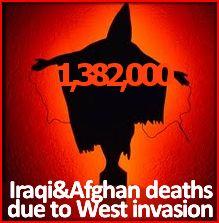I’ve blogged in detail about Zionist hasbara (propaganda), now two Israeli groups have set up training courses in Wikipedia editing with aims to ‘show the other side’ over borders and culture.
Since the earliest days of the worldwide web, the conflict between Israelis and Palestinians has seen its rhetorical counterpart fought out on the talkboards and chatrooms of the internet.
The Guardian reports that two Israeli groups seeking to gain the upper hand in the online debate have launched a course in “Zionist editing” for Wikipedia, the online reference site.
Yesha Council, representing the Jewish settler movement, and the rightwing Israel Sheli (My I srael) movement, ran their first workshop this week in Jerusalem, teaching participants how to rewrite and revise some of the most hotly disputed pages of the online reference site.
“We don’t want to change Wikipedia or turn it into a propaganda arm,” says Naftali Bennett, director of the Yesha Council. “We just want to show the other side. People think that Israelis are mean, evil people who only want to hurt Arabs all day.”
Wikipedia is one of the world’s most popular websites, and its 16m entries are open for anyone to edit, rewrite or even erase. The problem, according to Ayelet Shaked of Israel Sheli, is that online, pro-Israeli activists are vastly outnumbered by pro-Palestinian voices. “We don’t want to give this arena to the other side,” she said. “But we are so few and they are so many. People in the US and Europe never hear about Israel’s side, with all the correct arguments and explanations.”
Like others involved with this project, Shaked thinks that her government is “not doing a very good job” of explaining Israel to the world.
And on Wikipedia, they believe that there is much work to do.
Take the page on Israel, for a start: “The map of Israel is portrayed without the Golan heights or Judea and Samaria,” said Bennett, referring to the annexed Syrian territory and the West Bank area occupied by Israel in 1967.
Another point of contention is the reference to Jerusalem as the capital of Israel – a status that is constantly altered on Wikipedia.
Other pages subject to constant re-editing include one titled Goods allowed/banned for import into Gaza – which is now being considered for deletion – and a page on the Palestinian territories.
Then there is the problem of what to call certain neighbourhoods. “Is Ariel a city or a settlement?” asks Shaked of the area currently described by Wikipedia as “an Israeli settlement and a city in the central West Bank.” That question is the subject of several thousand words of heated debate on a Wikipedia discussion thread.
The idea, says Shaked and her colleauges, is not to storm in, cause havoc and get booted out – the Wikipedia editing community is sensitive, consensus-based and it takes time to build trust.
“We learned what not to do: don’t jump into deep waters immediately, don’t be argumentative, realise that there is a semi-democratic community out there, realise how not to get yourself banned,” says Yisrael Medad, one of the course participants, from Shiloh.
Is that Shiloh in the occupied West Bank? “No,” he sighs, patiently. “That’s Shiloh in the Binyamin region across the Green Line, or in territories described as disputed.”
One Jerusalem-based Wikipedia editor, who doesn’t want to be named, said that publicising the initiative might not be such a good idea. “Going public in the past has had a bad effect,” she says. “There is a war going on and unfortunately the way to fight it has to be underground.”
In 2008, members of the hawkish pro-Israel watchdog Camera who secretly planned to edit Wikipedia were banned from the site by administrators.
Meanwhile, Yesha is building an information taskforce to engage with new media, by posting to sites such as Facebook and YouTube, and claims to have 12,000 active members, with up to 100 more signing up each month. “It turns out there is quite a thirst for this activity,” says Bennett. “The Israeli public is frustrated with the way it is portrayed abroad.”
The organisiers of the Wikipedia courses, are already planning a competition to find the “Best Zionist editor”, with a prize of a hot-air balloon trip over Israel.
Critics cite the editing problems as proof of a flawed site that can be edited by almost anybody, but its defenders claim the issues are tiny compared with its scale. Wikipedia now has versions in 271 languages and 379 million users a month.
For the first time in living memory, Israel is losing the propaganda war.
Despite most of the corporate media supporting Israel, Israel could not hide the disgusting murder of 9 human rights activists on the recent Flotilla.
How, you may ask, did this happen?
Well, it was simple. Millions of Muslims used the internet to get the message out to the wider non-Muslim network.
Whether it was Facebook or writing comments on forums and blogs, the real message could not be stopped.
It just shows what you can do if you get politically smart and active.







Well we’ve known this for a long time. One only has to look at the content of prominent pages regarding Palestine or Muslims to see how a paid and well trained army of zionist editors is abusing Wikipedia.
So much so that anyone who knows anything will pretty much take any Muslim related page on Wikipedia with a pinch of salt.